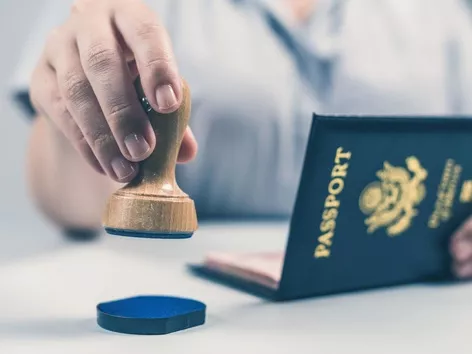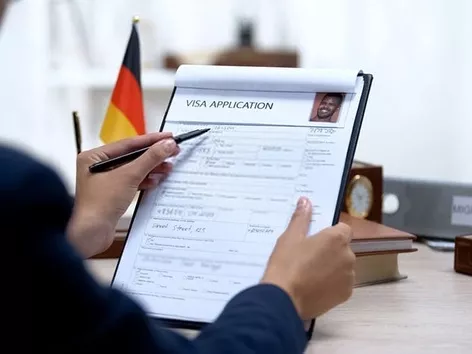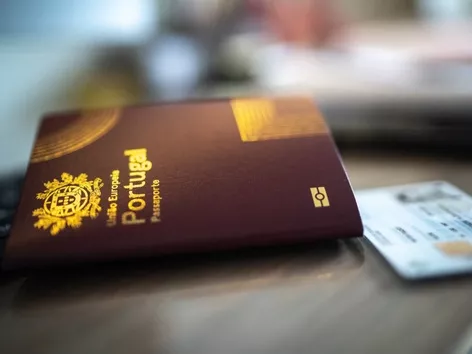Residence Permit, Permanent Residence and Citizenship: what are these statuses and how do they differ?
Table of contents
- What is the difference between a temporary, permanent residence permit and citizenship?
- What is a temporary residence permit?
- - What are the ways to obtain a temporary residence permit?
- - Advantages of a temporary residence permit
- What is a permanent residence permit?
- - How can you get a permanent residence permit instead of a temporary residence permit?
- - Advantages of a permanent residence permit
- What is citizenship?
- - Benefits of citizenship
- Temporary, permanent residence permit or citizenship – what to choose?
- How long does it take to obtain citizenship through a permanent residence permit?

Moving abroad is always associated with obtaining permits. In general, for legal living in another country, a foreigner can obtain one of the following documents: a residence permit, a permanent residence permit or citizenship. Find out what distinguishes each of the statuses and what features these documents have
Residence permit, permanent residence permit and citizenship are three different immigration statuses that a person living abroad can obtain. Each of them has its own unique advantages and features, which depend on the goals. More about documents for legalization abroad later in this article.
What is the difference between a temporary, permanent residence permit and citizenship?
- A temporary residence permit gives a foreigner the right to a short-term stay in the country and a certain number of opportunities. Suitable for short-term trips (short-term studies, tourism, work on a business trip).
- A permanent residence permit is a long-term document, this decision gives the right to obtain permanent resident status, and with it additional benefits: long-term stay, the right to work, social benefits, the ability to move with family, etc.
- Citizenship is the most difficult to obtain, but it gives an expat the maximum rights, including the opportunity to participate and the right to a passport.
The choice of migration status depends on each individual situation and the individual goals of the foreigner - whether it is study, business or long-term residence in the country of your choice, or in several countries at once.
Read more about each status in our guide.
What is a temporary residence permit?
A temporary residence permit is a document that gives a foreigner the right to legally stay in the country for a certain period of time. In some countries, the issuance of a permit may be accompanied by the registration of the right to work, as well as the provision of limited access to social services, healthcare and education.
- What are the ways to obtain a temporary residence permit?
1. Work.
To obtain a temporary residence permit, you must have a contract with an employer from the destination country or provide proof of qualifications and an invitation from a local company. People who demonstrate their intention to work remotely in the destination country, as a digital nomad, can also obtain a permit. Some countries, such as Germany, issue temporary residence permits to study vacancies in local companies with a parallel internship. This immigration route is often called a job search visa.
2. Study.
Expats who enroll in one of the country's educational institutions can obtain a temporary residence permit. To obtain a residence permit, in this case, proof of financial independence to pay for studies and living in the country is also required.
3. Family reunification.
To obtain a residence permit under this system, you need to prove family ties with the holder of citizenship or a permanent residence permit of the destination country. Family reunification is most often possible with a husband or wife or children who receive a residence permit.
4. Investment.
People who have contributed to the economy of the chosen country, purchased real estate, securities, invested money in investment funds, culture, etc. can obtain a residence permit. The minimum amount and other conditions for obtaining a permit depend on the chosen country and the method of investment.
5. Business.
Residency can be obtained by foreigners who have opened a business in the country, bought an existing one or moved a company from abroad.
6. Special programs.
For example, obtaining a residence permit to gain access to the healthcare system for long-term treatment (medical tourism).
- Advantages of a temporary residence permit
1. The right to legal residence in the country - the owner has the right to stay in the country longer than the validity of a tourist visa or visa-free travel for tourists.
2. Freedom of movement - in many cases, a residence permit allows visa-free travel to other countries. In particular, this rule is relevant for the Schengen zone and EU countries, South American countries, the Caribbean Community, etc.
3. Access to the labor market. Obtaining a residence permit often provides the opportunity not only to live in the country, but also to work in the destination country.
4. Social sphere – access to the local education system, healthcare on simplified terms.
5. The right to do business in the country.
6. The right to obtain a permanent residence permit and citizenship in the future.
Planning a trip or move abroad? An important part of a successful trip is an insurance policy, as it guarantees high-quality medical care anywhere in the world and can protect you from unnecessary expenses while travelling. You can buy insurance from trusted agents on the Visit World portal.
What is a permanent residence permit?
A permanent residence permit is a status that gives a foreign citizen the right to long-term or indefinite residence in a country without the need to renew the permit every year. It gives a foreigner more rights than a residence permit. It is usually inferior to citizenship only in the section of political rights, as it does not allow a foreigner to participate in voting.
- How can you get a permanent residence permit instead of a temporary residence permit?
1. Minimum period of stay - a foreigner must live in the country with a temporary residence permit for a certain period of time.
2. Financial stability - confirm the presence of an income sufficient to live in the country.
3. Integration - to obtain the status, basic language skills are required, as well as knowledge of local laws, understanding of the cultural characteristics of the country, etc.
4. No criminal record – to obtain a permanent residence permit, you must prove that you have no criminal record. In some countries, even minor offenses are unacceptable.
- Advantages of a permanent residence permit
1. Long-term and stable – in most countries, a permanent residence permit is issued indefinitely or for a long period (for example, 10 years) with the possibility of automatic extension. A temporary residence permit differs from a permanent one in that it is less likely to be revoked if the grounds for its issuance are lost. For example, upon dismissal from work.
2. Expanded access to the social sphere – the permit gives the right to state health care, free education and pension provision.
3. Freedom of movement and employment – holders of a permanent residence permit have the opportunity to freely change employers without additional permission. For example, a permanent residence permit in the EU countries allows you to live and work in other EU member states, changing employers without fear of losing your immigration status.
4. There is no need to constantly renew the permit - if you obtain a permanent residence permit, you can forget about the permanent extension of your immigration status.
5. The last step before obtaining citizenship. The basis for obtaining citizenship is the presence of a permanent residence permit.
What is citizenship?
Citizenship is a special relationship between a person and a state. A citizen receives a full range of rights and obligations within the framework of the legislation of specific countries.
In addition to the status of a citizen, a foreigner has the right to a passport, political protection, participation in elections, as well as unlimited and preferential access to national healthcare and education systems.
However, before obtaining citizenship, it is important to understand the difference between dual and second citizenship.
1. Dual citizenship – when both countries of citizenship simultaneously recognize an individual as a citizen within the framework of their legal systems, as they have a special agreement, for example: France and Canada have agreements that allow dual citizenship.
2. Second citizenship – a foreigner has citizenship of two (or more) countries, but each country considers him as its citizen.
- Benefits of citizenship
1. Political protection – the holder of citizenship can count on consular assistance abroad, including evacuation in emergency situations.
2. A passport, which often provides visa-free access to a large number of countries. For example, the Maltese passport allows visa-free travel to almost two hundred countries and territories.
3. Rights to participate in political voting – holders of citizenship have the right to vote in elections, hold public office and otherwise participate in the political life of the country.
4. Unlimited stay and investment – citizenship gives you the full right to live in the country, work and own real estate, avoiding restrictions.
5. The right to transfer citizenship to children.
Temporary, permanent residence permit or citizenship – what to choose?
For short-term stay and acquisition of basic rights, it is recommended to choose a temporary residence permit. A temporary residence permit is relevant for temporary employment or study in the host jurisdiction.
For long-term residence and broader socio-economic benefits, choose a permanent residence permit.
Citizenship will be the optimal choice if the goal is to obtain maximum freedom and political rights.
How long does it take to obtain citizenship through a permanent residence permit?
The term depends on the rules and laws of a particular country. Often, it is allowed to apply for citizenship already at the time of obtaining a permanent residence permit.
On average, we can say that this period is from 3 to 10 years.
To understand all the intricacies of the migration legislation of the chosen country, consult a migration lawyer. The specialist will introduce you to the features of each status and help you prepare the necessary package of documents.
Contact a lawyer today to prepare documents for a new exciting adventure tomorrow!
Reminder! Children can obtain citizenship at the place of birth, regardless of the citizenship of their parents and nationality. We have already told you which countries grant the right to obtain citizenship upon birth on their territory in 2025.
Products from Visit World for a comfortable trip:
Travel guide for 200 countries;
Legal advice from a local specialist on visa and migration issues;
Travel insurance around the world (please select the country of interest and citizenship to receive services);
Medical insurance all over the world.
We monitor the accuracy and relevance of our information, so if you notice any errors or inconsistencies, please contact our hotline.
Frequantly
asked questions
How does a residence permit differ from a permanent residence permit?
Is permanent residence the same as citizenship?
What is the difference between an EU citizen and a resident?
Recommended articles
1 min
Work
Job seeker visa Germany: what kind of permit is it, how to get a visa and a package of documents
Germany is a European country with the strongest economy in the region and a developed social sphere. Many foreigners dream of living and working in this country, but to move you need to get a visa. One of the available types of permits is a job seeker visa. Find out who can get this type of visa and how to apply for a German job seeker visa
27 Jan. 2025
More details2 min
Expats
The active changes in US immigration policy since Donald Trump came to power are affecting the lives of millions of foreigners, both in the country and abroad. In particular, the possible abolition of birthright citizenship has negatively affected thousands of families. Find out what alternative legalization paths are available to foreign families in the US after the abolition of birthright citizenship
01 Feb. 2025
More details1 min
Residence permit
Golden visa Portugal: available investment methods in 2025 and the current permit procedure
To improve the efficiency of processing applications and address delays in issuing Golden Visas, the Portuguese authorities have introduced certain changes. Learn how to get one of the most popular golden visas in Europe in 2025
01 Feb. 2025
More details1 min
Expats
Digital Nomad Visa in Europe: top countries with the lowest requirements for foreigners in 2025
Every country in the world has its own requirements for applying for a digital nomad visa, but in most countries the main condition is to have an appropriate level of income. Find out which European countries have the lowest income requirements for digital nomads in 2025
06 Feb. 2025
More detailsAll materials and articles are owned by VisitWorld.Today and are protected by international intellectual property regulations. When using materials, approval from VisitWorld.Today is required.
